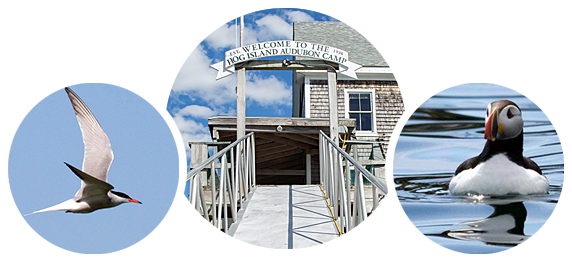By David Klinger
I know we are on the right track because Juliet French told me so.
When I first met this charming and delightfully engaging 91-year-old Providence, Rhode Island, woman, she was sitting quietly alongside “Gracie’s Garden”, not far from where she landed on Hog Island in 1936 as the Audubon Camp’s first arrival.
When I left her, Juliet French — for nearly seven decades a friend of Hog Island — was sitting alone, busily annotating E. O. Wilson’s latest work.
“Marvelous,” was her assessment of the summer work camp, which drew intrepid workers from all walks to life to come to Hog Island with one thing — restoration — on their minds.
Juliet told me of how she registered for Harvard’s first summer ornithology course many years ago, and how that led to her becoming Hog Island’s first camper, and to a long love affair with this place. She went on to a long and distinguished career with the New England Wildflower Society and Massachusetts Audubon.
But in 2001, she was back at the Audubon Camp with son-in-law and camp alumnus Doug Morse and his wife Else, offering encouragement to volunteer workers as she caught up on her accumulated reading in “Gracie’s Garden.”
When I left her, Juliet French — for nearly seven decades a friend of Hog Island — was sitting alone, busily annotating E. O. Wilson’s latest work. She died barely three months later.
That hour I spent with her in “Gracie’s Garden” is all the more precious to me now.

I know, too, that we are on the right track from meeting Jill Mallios, who lives near Lancaster, Pennsylvania. Until July, she had never set foot on Hog Island. She was the last arrival among the week’s 39 volunteers, and perhaps this camp’s newest “friend.?” The 53-year-old massage therapist had surfed the internet seeking bird expeditions and summer camps. There, she discovered the Audubon Camp, and settled on the Friends of Hog Island’s work week as an ideal blend of the two.
Jill found many takers for her professional skills from among FOHI’s comfortably weary volunteers, and she set up shop on the deck of the Queen Mary for impromptu massages.
“If I ‘graduate,’ I’ll be a friend of Hog Island, and a voice for this place in my hometown,” she told me.
That a week of hard work and volunteer labor among strangers can somehow bridge differences of age and geography says a great deal about the exciting things that are beginning to happen under FOHI’s leadership and inspiration.
I don’t yet know where they will take us.
But from what Juliet French and Jill Mallios taught me, I know we are on the right track.
David Klinger first came to Camp in 1972 as a “kitchen boy.” His time on the island encouraged him in the environmental field. When he wrote this essay in the spring of 2001, he worked at the U. S. Fish & Wildlife’s National Conservation Training Center in Shepherdstown, West Virginia, as a writer and editor.

